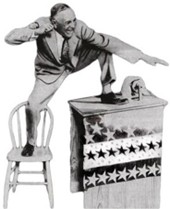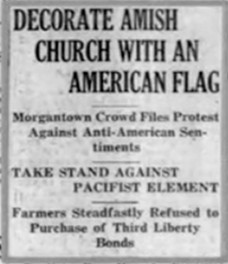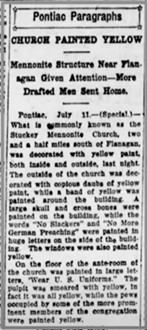
Unfortunately, the abuse, ridicule, and vandalism were not limited to men resisting the draft. The faithful in various Anabaptist groups often faced persecution from the very communities in which they had grown up. Demands for total conformity to the patriotic spirit swelled to a fever pitch during the war. Americans insisted on patriotism as a national requirement.
In an example of the feverish outcry against those who did not support war, The New York Times, on June 9th, 1917, went so far as to print evangelist Billy Sunday’s call for the death of war resistors:

We have no use for the shirker—no use for the man between 21 and 31 who did not register… As for the fellows who knock registration or conscription or buying [war] bonds, if I had my way, I would line them up against a wall and shoot them like any other traitor.
Such inflammatory words, especially from American icons like Billy Sunday, helped incite public opinion against the Anabaptists and other pacifist groups. As the war progressed, this demand for patriotic fidelity did not remain limited to hot-headed extremes; rather, it became national policy.
Laws limiting free speech, insistence on purchasing war bonds, taking pledges of loyalty, and even requirements for women to make public pledges about what they were willing to limit on their dinner tables all led to violence against the Anabaptists. These policies created an environment of suspicion and hostility towards those who, due to their religious convictions, could not fully participate in the war effort. This period of intense nationalism and intolerance highlights the challenges faced by nonresistant or pacifist groups in times of war. It was in these times their deeply held beliefs came into conflict with prevailing societal expectations and government mandates.
Real examples include an Amish Mennonite Church north of Lancaster, Pennsylvania, falling victim to vandalism, with local newspaper coverage nearly celebrating the act. Several Anabaptist men were seized by lynch mobs and coerced into buying war bonds. Those who bravely resisted often faced brutal treatment, including being tarred and feathered, beaten, and threatened.

Across the country, Anabaptist churches were targeted as disloyal. Mobs of Americans would surround these buildings, decorate windows with American flags, or paint the structures yellow.
More notable examples of this harassment occurred in:

As the war continued the persecution of Anabaptist communities during World War I escalated to the point where several churches across the country were even burned to the ground. Some notable examples include:
Continuing the public harassment and attacks, newspapers often literally encouraged harsh treatment of Anabaptist churches, as exemplified by the headlines from Columbus, Ohio, which proclaimed:
AMISH TOLD TO SUPPORT THE GOVERNMENT OR LEAVE HOMES.
Plain City Residents Weary of Trifling with Conscientious Objectors ULTIMATUMS SENT OUT
Another alarming example came from a region in Oklahoma that demanded 100% patriotism. Anyone not participating in the patriotic program faced persecution. This atmosphere of intolerance and coercion put immense pressure on Anabaptist communities to compromise their nonresistant beliefs or face severe consequences.
The strength and commitment of Anabaptist communities during World War I was indeed inspirational. Paradoxically, the persecution they faced during this time served to strengthen the church.
However, in the aftermath of WWI, the convictions surrounding nonviolence and nonresistance began to gradually diminish within some Anabaptist circles. As soon as the persecution ended, new temptations to be involved in political agendas led many back into politics. Once the political agendas were embraced, the Biblical answers taught by Jesus faded. This erosion of nonresistant principles did not occur overnight. Rather, it was a slow, subtle process that unfolded over time. As Anabaptist communities became increasingly involved in politics and integrated into mainstream society, their traditional convictions began to falter.
While Americans Anabaptist were getting caught in the politics of prohibition and fundamentalism, German-speaking Mennonites around the world were listening to the speeches of Adolf Hitler. He was a zealous leader who told them that he stood for sound economic principles, family values and Christian principles. In the aftermath of World War I, people across Germany were searching for answers to their nation’s problems. Unfortunately, many were looking in the wrong places. The Bible, once considered a blueprint for life, seemed to lose its central role in guiding decisions. Some turned to Western ideas of democracy and capitalism, while others looked East, intrigued by the new ideology of Marxism. Regardless of their chosen direction, there was a widespread longing for a bold nationalism that would restore Germany’s honor and protect what little wealth, freedom, and property remained.
This atmosphere set the stage for major compromises in traditional values and beliefs.
Into this volatile situation stepped Adolf Hitler, a zealous, strong-handed political radical who appealed to conservative Christians. Hitler promised to unify the German people, protect them against communism, and even implement a series of “economic stimulus packages.” His platform claimed to uphold Christian morality while ensuring prosperity for all “good Germans.” While some were cautious about Hitler’s intensity, many were swayed by his proposed solutions to Germany’s pressing issues. It’s crucial to remember that Hitler came to power through a fair democratic election process. While many liberals preferred communist candidates, conservative Evangelicals, along with German Mennonites, cast their votes for the charismatic new leader. With support for the farmers and business combined with Christian vocabulary, Hitler won the hearts of the German Evangelicals and Mennonites

As part of Hitler’s “stimulus package” in 1933, he canceled all farming debts and reformed trade relations to benefit German farmers. These changes elevated farmers to a privileged class within German society. Meanwhile, communist supporters were sent to concentration camps, and Germany swiftly reclaimed territories lost after World War I through military actions.
Germans were thrilled with these changes. When Austria was “annexed” into Germany, the populace was electrified. The enthusiasm was so great that some Protestant churches even replaced the cross above Martin Luther’s chapel with a swastika.
What effect did this Nazi nationalism have on the Mennonites?
Historically, Mennonites had maintained a separation from worldly politics. Could they engage in politics while resisting this new mindset? In a word—no.
Sadly, the Mennonites of Germany joined in the jubilant nationalistic sentiments sweeping the country. As a matter of record, German Mennonites were so enamored with their new “Führer” that they wanted to express their official gratitude to him. A telegram written on September 10, 1933, representing the sentiments of a recent church council, read:
To Chancellor Adolf Hitler, Berlin
The Conference of East and West Prussian Mennonites, assembled today in Tiegenhagen, Free State of Danzig, feels deep gratitude for the powerful revival that God has given our nation through your energy and promises joyful cooperation in the up building of our Fatherland through the power of the Gospel, faithful to the motto of our forefathers: No other foundation can anyone lay than that which is laid which is Jesus Christ. 10
Hitler surely didn’t take time to answer every telegram he received, but he replied to this one personally:
For your loyalty and your readiness to cooperate in the up building of the German nation, expressed in your letter to me, I express my sincere thanks. Adolf Hitler 11
In defense of these German Mennonites, we must remember that Hitler’s full atrocities were not completely known at this time. However, this teaches an important lesson: when the church gives its support and affirmation to worldly ways, when it condones “lesser evils,” it may find itself praising an Antichrist.
Caught up in the sentiment of the day, in 1933 the United (Vereinigung) Mennonites stopped asking for special treatment as conscientious objectors from military service. By 1934, “nonresistance” was removed from the Mennonite confession of faith.
In 1939, when German armies took over West Prussia and Danzig, bringing the Mennonites of Danzig (North Germany) under German rule, many Mennonites saw it as an act of God. Emil Händiges of the United (Vereinigung) Mennonites wrote:
“Our German people have endured unspeakable difficulties under the Polish yoke during its twenty-year foreign rule, the most difficult at the end. Then God, the Lord, helped them through the hand of our Führer and freed them. We thank our Führer for this act of liberation.” 12
Mennonite and conservative Evangelical journals praised these military conquests by German soldiers. These publications frequently quoted from the prophets and the Book of Revelation, portraying Germany as “God’s people” in prophecy.
Today, it’s easier to think of these German soldiers as committed pagans and monsters. “After all,” we tell ourselves, “how else could they have conducted all of these terrible deeds?” The sobering truth is that most of these German soldiers claimed to be Christians. Astonishingly, the belt buckle worn by many of these so-called “Christian” Nazi soldiers boldly proclaimed, “Gott Mit Uns” (God With Us).

By 1940, the subtle influence of this political leaven had almost completely overtaken the German Mennonites. Issuing a proclamation representing the political posture of the Mennonite Union during this time, the United Mennonite church wrote:
The Conference will not do anything that would even have the faintest appearance of opposing the policies of our leader (Führer). 13
Could they still be called Anabaptist? But more importantly, could they be called followers of Jesus?
These changes were a far cry from the decree of separation from the world and shunning of earthly government espoused by the early Anabaptists in the Schleitheim Confession of 1527. It’s evident that their original convictions had grown stale.
During this time of compromise, small groups of first-generation Anabaptists emerged on the scene. A new group led by Eberhard Arnold was just becoming organized. 14 Enthusiastically embracing the foundational ideas of Anabaptism, they were dismayed by the posture of their Mennonite spiritual cousins.
When Nazi authorities learned of these new Anabaptists, who were known as the “Bruderhof,” they became alarmed. Their radical theology and particularly their strong economic stance was more than the Nazis would tolerate. This scrutiny also brought heat to the more politically accommodating Mennonites, who were also called “Anabaptist.” When authorities asked the politically-friendly Mennonites if they were associated with the new Bruderhof, the Mennonites didn’t exactly stand up for them. In a united effort, both the north and southern Mennonites issued an official disclaimer: “The Bruderhöfer belonged neither to the Vereinigung (Union) of German Mennonite Churches, nor to any other organization within our Free German Mennonite Church.” 15
It wasn’t long before this new Bruderhof was raided. Fortunately, most members escaped the country, ending up as refugees in England. When England, America, and Canada refused to let the new group settle, American Mennonites came to their rescue through the Mennonite Central Committee (MCC). The MCC helped the Bruderhof immigrate to Paraguay, close to a group of Colony Mennonites that the MCC was already assisting.
When Dean, one of the writers of this paper, lived in Germany twenty years ago, he was a new convert to many of these Anabaptist ideas. Walking into a Mennonite church, he noticed the war memorials on the walls honoring Mennonites who fought in the war. Dean asked his guide, a man in his seventies who remembered the war period well, “How did the Mennonites get swept up into all of this Nazi nationalism?” The guide somberly replied, “It came over us like a revival.”
That was an impressive answer, and at the end it did indeed come on them like that. But was it completely unexpected? Was there a long time of slow compromise, more insidious than the Mennonites could perceive? As the years go by and we watch the way that modern conservative Mennonites respond to politics, we can somewhat understand how this could happen again. As James Peter Regier says in the conclusion of his excellent essay on this historic period of Mennonite history,
“It seems then, that the biggest flaw of the Mennonites was not any immediate error. Instead, it was the natural consequence of years of gradual theological adaptations and compromises to better fit within the German community. When National Socialism came, the Mennonites no longer had the capacity to resist.” 20
Have we learned that trusting in “good” political strategies is a really bad idea? When you hear your fellow Christian start telling you once again, “Times are different now,” please don’t believe them. Better yet, tell them that you think that it is exactly because the “world is getting so bad” that it is time to leave the failed solutions of the world and to start showing a model for the world created by our Savior Jesus Christ.
We cannot afford to be idle; a war is raging all around us. Simply opting out of secular politics isn’t our goal. We possess an agenda and a cure for this broken world. The Apostle Paul urged us: “You therefore must endure hardship as a good soldier of Jesus Christ” (2 Timothy 2:3). Yet, immediately after, he made it clear that our endurance must come without fraternization with the enemy or entanglement in the affairs of the nation’s we sojourn: “No one engaged in warfare entangles himself with the affairs of this life, that he may please him who enlisted him as a soldier” (2 Timothy 2:4). Anabaptist historian Marcus Yoder, when discussing his view of actively embracing these ideals, often says, “There are things that I am willing to die for, but there is nothing that I am willing to kill for.”
The path to freeing yourself from the leaven of politics and compromise is simple, but for some, it will not be easy. Like the early Christians and Anabaptists, seek a deep connection with God and immerse yourself in the New Testament. Read the teachings of Christ and dare to take them seriously. Let your prayer be: “Thy Kingdom come on earth as it is in heaven.” As you read the words of Jesus consciously receive that “This is Jesus’ political plan for humanity.” Then, by His grace and his Holy Spirit, put it into practice. With this in place, let us, as author and teacher John D. Martin often says, “Demonstrate to the world around us what the whole world would look like if we would only obey the King.”
In this series, we have soberly pondered the 500th anniversary of Anabaptism. In 500 years, praise God, there are many things that we can celebrate. However, we also want to consider that in 500 years, we have made many mistakes. Like many of the stories in this article, we have strayed many times. Michael Sattler, one of the early leaders of the Anabaptists, warned his church in Horb, Germany while awaiting his execution, “Let no one shift your goal, which has been set in the letter by the Holy Scripture, which is sealed by the blood of Christ and of many witnesses of Jesus.”21 This caution not to “shift your goal” needs to ring in our hearts again.
Each generation has its own tests and challenges. In 1660, Thieleman J. van Braght wrote in his introduction to the Martyrs Mirror these sobering words, which are arguably more pertinent in modern times:
“These are sad times, in which we live; nay, truly, there is more danger now than in the time of our fathers, who suffered death for the testimony of the Lord. Few will believe this, because the great majority look to that which is external and corporeal, and in this respect it is now better, quieter and more comfortable; few only look to that which is internal and pertains to the soul, and on which everything depends.”
In Hebrews 11, the New Testament writer left us with a litany of testimonies of faith intended to both challenge and encourage us. Take note of the last few words at the end of the chapter, “that they should not be made perfect apart from us” (Hebrews 11:40). In other words, without us, the testimonies of these heroes of faith are not complete. Or we could shift it into a command: “get going; it’s our turn now.”
Let us not get distracted, or, as Michael Sattler challenged, “let no one shift your goal.” The string of faith is completed as we walk faithfully in our generation. In the end, we are confident that the same simple commitment that guided our forefathers will keep us on the right path. Keeping the simplicity of biblical interpretation and a settled confidence that the words of Jesus are meant to be put into practice, we are hopeful that the Holy Spirit will continue to guide and sustain us until His return.
Keep the Faith
10 Goertz, Hans-Jürgen. “Nationale Erhebung und Religiöser Niedergang,” Mennonitsche Geschichtsblätter 31 1974: 64. Quoted in: Mennonite Life, Mennonitische Vergangenheitsbewältigung: Prussian Mennonites, the Third Reich, and Coming to Terms with a Difficult Past, James Peter Regier, March 2004.
11 Lichdi, Diether Goetz. “The Story of Nazism and its Reception by German Mennonites,” Mennonite Life, 36, no. 1 April 1981: 25.
12 Händiges, Emil. “Zur Heimkehr der bestreiten Volksgenossen ins Reich” Mennonitische Blätter 86, no. 10-11 October/November 1939.
13 Goertz. “National Erhebung” 84. Original quotation: “Die Konferenz wird nichts tun, was den Anschein eines Huches gegen die Politik unseres Führers enthält.”
14 The Bruderhof community originated in the early 1920s under Arnold’s leadership in Germany, influenced by religious revival and socialist youth movements. They became drawn to Anabaptism and eventually united with the North American Hutterites in 1930. Most of the group moved to England in the late 1930s and then on to Paraguay in the early 1940s to avoid military conscription and persecution. In the 1950s and 60s, the Paraguayan Bruderhof emigrated to New York. Their prior unification with the North American Hutterite communities was called into question throughout the years because of differing beliefs and practices.
The Hutterites excommunicated the Bruderhof in 1954 but reunited on a probationary basis in 1975 after a formal apology from Bruderhof leadership. The Hutterian communities excommunicated the Bruderhof
communities again in 1990. We choose to call this group Bruderhof rather than Hutterite to avoid confusion. Today, Bruderhof communities exist in the North America, South America, Asia, and Australia.
15 Schroeder, “Prussian Mennonites,” 22.
20 Regier, James Peter. Mennonite Life, Mennonitische Vergangenheitsbewältigung: Prussian Mennonites, the Third Reich, and Coming to Terms with a Difficult Past, March 2004
21 Sattler, Michael. Legacy of Michael Sattler. Scottdale, PA: Herald Press, 1973. 55
The information on this article was taken from a paper prepared by ViewPoint: Anabaptists working together on current issues.
Writing team: Merle Burkholder (ON), Ken Miller (VA), Stephen Russell (PA), Dean Taylor (OH)







